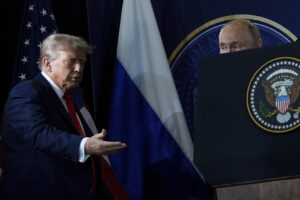A Growing Indo-Sino Tussle in the Maldivian Background
From a realpolitik perspective, considering the Maldives’ economy and geography, one might wonder why two Asian giants are so keenly contesting a tug-of-war over the island state. This is where the Indian Ocean comes in.

On January 7, 2024, the Government of Maldives suspended three Deputy Ministers for labelling the Indian Prime Minister Narendra Modi a “clown” and a “terrorist”, following Modi’s visit to India’s Lakshadweep islands to promote regional tourism. Though Modi did not mention the Maldives by name in any of his social media posts, his visit to the Lakshadweep islands, known for their pristine beaches, was seen by many Maldivians as an attempt by the Indian government to draw tourists away from their nation, whose economy heavily relies on Indian tourism. In turn, the three ministers’ negative reactions to the Indian Prime Minister’s visit prompted numerous Indian celebrities to call for a travel boycott of the Maldives.
On the surface, this seems an unlikely feud between two nations of contrasting economic, military and geographical might. But looming large over this dispute is India’s tussle with China for dominance in South Asia, and it is this tussle that has wedged itself into Maldivian politics.

OVERVIEW
THE TIES
This souring of relations is a recent phenomenon for the two nations, which have historically shared positive ties. Apart from being one of the first states to recognize Maldivian sovereignty in 1965, India prevented a coup in the Maldives in 1988 and greatly assisted the nation following the 2004 tsunami. Through the years, India has also contributed to bolstering the Maldives’ security forces, and has undertaken large-scale infrastructure projects.
It was when Abdulla Yameen (2013-18) became president that relations between India and the Maldives began to fray. The Maldivian president took a more pro-China stance that undermined Indian influence in the region, and signed a controversial Free Trade Agreement during a meeting with Chinese President Xi Jinping. China, which did not have an embassy in Male, the Maldivian capital, until 2012, undertook infrastructure projects — worth more than a billion dollars — throughout the country.
MALDIVIAN POLITICS
To understand this shifting geopolitical stance in Maldivian politics, it is important to be cognizant of the Maldivian presidents of the last decade and their political parties. Maldivian politics can broadly be categorized into two camps — the Maldivian Democratic Party (MDP) and the Progressive Party of Maldives (PPM). The MDP is known to take a “Pro-India” stance in its policies, while the PPM, former President Yameen’s party, tends to favor China as its Asian partner of choice. And it is from this quagmire of party politics that the current India-Maldives dispute emerges.
Ibrahim Solih of the MDP succeeded Abdulla Yameen as president after the 2018 elections, and India once again became a favored nation to undertake infrastructure projects. India committed billions to bail the Maldives out of debt, and in 2023, was the largest supplier of tourists to the nation where tourism accounts for one-third of the economy. But following internal party struggles and fears rising that his policies could lead to an Indian domination of the Maldives, Ibrahim Solih lost the 2023 presidential elections, giving way to Mohamed Muizzu of the People’s National Congress . Muizzu’s entire presidential campaign was centered around a rhetoric of “India Out”, and his victory signaled a shift yet again in the seesaw for geopolitical influence over the Maldives.
Muizzu abandoned unofficial protocol by not visiting India as his first foreign destination for an official visit, and called for an end to the small Indian military contingent in the Maldives. He further laid out import plans seeking to reduce the Maldives’ dependency on India, while agreeing to a “comprehensive strategic cooperative partnership” with China. In light of these policies, the unsavory remarks directed towards Prime Minister Modi by deputy ministers in President Muizzu’s government have only strained ties between the two nations.

ANALYSIS
From a realpolitik perspective, considering the Maldives’ economy and geography, one might wonder why two Asian giants are so keenly contesting a tug-of-war over the island state. This is where the Indian Ocean comes in.
The Maldives is strategically located just a few kilometres from the Sea Lines of Communication (SLOC), a vital route of transport for trade, logistics, and naval forces. Two-thirds of the world’s oil and half its container shipments pass through this SLOC. The route is of immense importance to China to overcome the Malacca Dilemma, where a huge chunk of Chinese trade taking place through the Malacca Strait could be halted by its enemies in the event of war. China consequently places significant importance in establishing control over the SLOC to secure its economic and military interests. India is also extremely dependent on maritime transport for its international trade, which amounts to $800 billion a year. Eighty percent of its oil and 60% of its natural gas requirements are met through imports. Equally important for India is its security. Flanked by hostile neighbours, losing influence in the Indian Ocean region could potentially lead to India being cut off from the rest of the world and at the mercy of unfriendly states. Control over the Maldives would allow China to use the island nation as a link between the Hambantota port in Sri Lanka and the Gwadar Port in Pakistan, both of which are already controlled by China. This would create a “String of Pearls” around India that could adversely affect its trade and military supplies in the event of a conflict with China.
“We don’t want any foreign military boots on Maldivian soil… I promised this to the people of the Maldives and I will live up to my promise from day one,” said Mohamed Muizzu. This quote simply affirms the Maldives’ right to exercise its sovereignty without getting sucked into great-power politics. But by potentially ramping up its agreements with China to reduce its dependence on India, the Maldives must beware of becoming another pawn in the dragon’s claw. The Maldives, having been one of the first signatories of the Belt and Road Initiative, now owes China $1.37 billion — 40% of its public debt — and, according to the IMF, is at a “high risk of external and overall debt distress.” It simply needs to look at two of its other South Asian neighbours, Pakistan and Sri Lanka, to see what happens when an economy borrows too much from China.
At the end of the day, the Maldives deserves the right to choose its partners, but with the parliamentary elections due in a couple of months, Maldivians need to carefully cast their votes for leaders who do not prioritize short-term political gains at the expense of the nation’s sovereignty. It is not just the future of the Maldivian islands, but potentially the political stability of South Asia that rests on Maldivian policies.

Swaraj Parameswaran has an MA in International Relations from King’s College London. His interest lies in geopolitics, armed conflicts, and human rights. He has previously written for organizations like Action on Armed Violence, Global Strategic and Defence News, Modern Diplomacy, and the International Affairs Forum. During his free time, he likes to immerse himself in an engaging novel, swim, or cook a meal in the kitchen.





A well written article- enjoyed reading it!